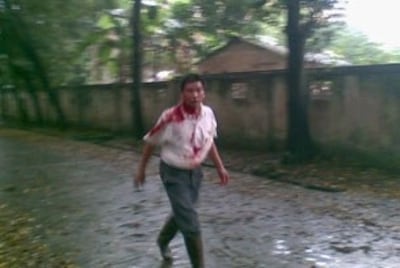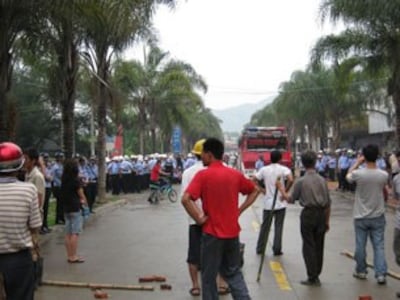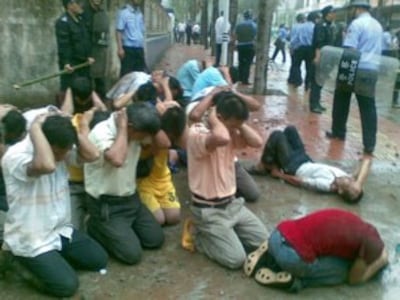HONG KONG—Police in the southern Chinese province of Guangdong said they had detained around 200 people following weekend riots, which erupted after weeks of attempts by local tea farmers to protest against alleged official corruption.
An employee who answered the phone at the Kengkouju police station in Yinghong township near Yingde city said nearly 200 people had been detained during the unrest, where angry residents rioted through the town on May 24.
Photos posted online showed a smashed and burning police station, rocks littered around the street, and cars on fire, as well as large numbers of security personnel and fire trucks.
"We have detained a great many people. Nearly 200, or thereabouts," the police station official said.
All we wanted to know was where the money had gone."
Wang, protester<br/>
"But a lot of them were just onlookers, and most of them have now been released. We are using video, which we took at the time [to identify suspects]. This was a very serious riot in which cars were burned, and we will be releasing a list of all those arrested."
'An impossible situation'

Residents said security forces had sealed off Yinghong township following Sunday's clashes, in which at least 1,000 angry villagers faced off with the authorities outside the local police station.
"The farmers in our village have been unable to take their complaint to the provincial government," a local resident surnamed Wu said.
"We were only able to pass on a letter to some of our fellow villagers currently working in Guangzhou, in which we denounce local officials for corruption, and they passed the letter on."
"We recognize that it was wrong of the villagers to burn cars, and that those who did so should be seriously dealt with. However, we were in an impossible situation."
The rioting came after Yingde municipal authorities said they had detained Yinghong residents "Li Yujiao and others" for "plotting to gather several hundred persons to petition at the city government office and creating traffic jams on April 29 and May 11 this year."
"This disrupted government business and hurt social stability," said the statement, which was posted on the Web site iFeng.com.
It accused the relatives of those detained of starting the riot deliberately and "inflaming the crowd" by saying that one detainee had been beaten to death.
"By 1 p.m., the crowd turned to attack mode. They threw rocks at three auxiliary policemen who were trying to persuade them to calm down," it said, accusing the protesters of vandalizing a fire truck and destroying government vehicles with petrol bombs.
"Some of them were armed with hoes, sickles, lime powder, bamboo sticks and other weapons, and faced off against the police," the government statement said.
"At 5 p.m., the Yingde police took strong measures against these criminal elements and restored calm and order."
Rock-throwing alleged

An eyewitness surnamed Zhou said around 2,000-3,000 people were gathered at around noon, and that the police were the first to use force.
"The township chief threatened to use force to disperse the crowd, but we did not leave," he said.
"At around 1 p.m., riot police began to beat up protesters and three elderly women were injured. We then began to fight back by throwing rocks at riot police."
He said police also began throwing rocks back at the infuriated crowd.
"Protesters were so furious that they began to smash police vehicles and set them on fire. We did not leave until 5 p.m. when more than 1,000 riot police were brought in to disperse the crowd by beating anyone they encountered regardless of their age."
"Those who didn’t get a chance to leave the scene were detained," Zhou said.
Another witness who declined to be named said police used dogs to chase and attack protesters.
"I was scared to death as thousands of police began to beat up protesters. They even unleashed their dogs to attack protesters who either ran up nearby hills or jumped into the river."
"I have lost contact with many of them," he added.
Tea farmers

A protester surnamed Wang said 200-300 farmers were taken away by police.
She said, "We did not attack the government. We didn’t stage an uprising. What we did was just a petition."
"All we wanted to know was where the money had gone. Instead of answering our question, the government used force to deal with us," Wang said.
The initial petitioners were tea farmers from the region who were sent back to China during the Vietnam war in the 1970s, and who say they have suffered economic discrimination ever since.
They accuse local officials of embezzling public money, but their petitions have not so far been accepted by official complaints offices.
Original reporting in Cantonese by Fung Yat-yiu and in Mandarin by Ding Xiao. Cantonese service director: Shiny Li. Mandarin service director: Jennifer Chou. Translated and written for the Web in English by Luisetta Mudie. Additional translation by Jia Yuan. Edited by Sarah Jackson-Han.
